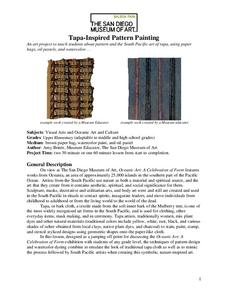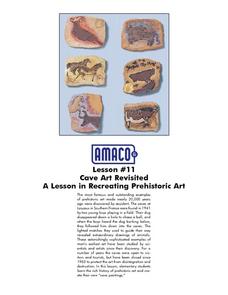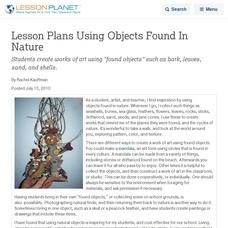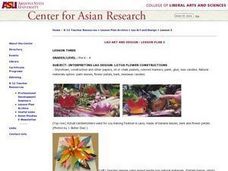Curated OER
Aboriginal-Style "Bark" Painting
Aboriginal art is full of symbolism, nature, and original style. Kids use natural symbols, paint, sticks, and cardboard to create a piece inspired by traditional Aboriginal bark painting. Tip: This resource is lacking examples and back...
Curated OER
Amate Bark Paintings/Folk Arts of Latin America
Students explore the history of bark paintings in South America and produce their own version of these paintings.
Curated OER
Simulated Bark Paintings
Students create simulated, traditional Native American "bark paintings" out of brown paper bags. They paint flowers, birds, animals or scenes of village life on the "bark" in bright colors using acrylic paint.
Sargent Art
Glass Jar Sand Art: Inspired by Navajo Sand Painting
Sand has been used as an artistic medium for centuries and can be found in cultures across the globe. The class examines sand art created by the Navajo people. They mix tempera paint and sand to create their colors, and then fill jars,...
Curated OER
Bark Art
Students examine Aborigines, a group of people indigenous, or native, to Australia. They view examples of Aboriginal bark art and create pictures in the style of Aboriginal bark art.
San Diego Museum of Art
Tapa-Inspired Pattern Painting
Middle schoolers are encourage to try their hand at traditional Oceania tapa art by crafting their own cloth using brown paper bags. Included in the resource is background information about the cultures of Oceania and their art.
Curated OER
ANCIENT ART/ABORIGINAL BARK PAINTING
Fifth graders explore Aboriginal art and how it is used in communication and story-telling. They create their own Aboriginal art out of brown paper, incorporating designs and patterns.
Curated OER
DRASING NATURE
Young scholars take samples of local trees and identify the tree using a field guide. They keep data for the tree on the Tree ID sheet. They create leaf, seed, bark, and flower prints and paint them.
Curated OER
Bark Casts
Students make a plaster cast of tree bark. They use plaster casts of tree bark to make a simple classification system. Also, they use plaster casts of tree bark to identify individual trees.
Curated OER
Painting with a Message
Students recognize the artwork of Keith Haring and understand that art teaches and informs. In this Keith Haring artwork lesson, students navigate a website to choose a topic to inform others and with their art.
Curated OER
Animal skeletal design-reduction relief prints
Sixth graders compare and contrast various forms of artistic expression associated with specific groups of people, geographic regions, or time periods, specifically, art of Australia, and create art works using procedures borrowed from...
Curated OER
Texture With Chemical Reactions
Young scholars explore the use of different textures in watercolor paintings in this late-elementary lesson. Emphasis is placed upon the art element of texture using the science of chemical reaction. The lesson includes one possible...
Curated OER
Cave Art Revisited
Students research the sources of prehistoric cave paintings and engage in an activity of creating their own cave art. The lesson focuses on the design, composition style of the art, and importance of cultural contributions cave painting...
Curated OER
Lesson Plans Using Objects Found In Nature
Students create works of art using "found objects" such as bark, leaves, sand, and shells.
Curated OER
Norval Morrisseau
Students investigate the art of Norval Morrisseau and create "x-ray paintings" using styles and symbols related to his work in this one or two day art lesson for third grade through twelfth grade. Emphasis is placed upon creative...
Curated OER
Side by Side: Butterfly Wings and Symmetry
Students observe butterfly images and then draw and paint their own design. They use this activity to explain symmetry.
Curated OER
Northwest Coast Indians: Winter Celebrations Potlatch
Upper elementary learners engage in a study about the Potlatch as a Northwest Coast Indians social custom. Groups of pupils plan their own Potlatch ceremony; incorporating activities and creating gifts much like the ones that the Indians...
Curated OER
Native Americans of the Chesapeake Bay: Using Primary vs. Secondary Sources
Discover the rich Native American culture that existed at the time of early European exploration into the Chesapeake region through analysis of several primary and secondary sources.
Curated OER
Analogies
When you understand the relationships between words, your vocabulary and reading skills will increase! Work on a set of analogies with multiple choices for learners to select.
Curated OER
Lao Design: Lotus Flower Constructions
Young scholars create lotus flowers in 3-D designs applying Lao art techniques. Following a teacher demonstration, they assemble their own lotus flower candleholders and the teacher arranges a group flotation in a body of water. Students...
Curated OER
Punctuation
Should that pause in your sentence be long, short, or somewhere in between? Practice using commas and semicolons with a series of grammar activities. High schoolers read a series of sentences and paragraphs and decide where they should...
Curated OER
Very, Very, Simple Decorative Papers
Elementary schoolers gather flowers, leaves, fiber, ribbons and newspapers to expand studenT awareness of their environment. They use these to make printmaking papers, cards, book covers, picture frames and photo mats. Beautiful results...
Dick Blick Art Materials
Very, Very Simple Decorative Papers
Combine art and science with an activity that has kids gathering items from their environment to include in the decorative paper they create.
Wordoful.com
List of Idioms and Phrases
Good idioms are a dime a dozen. A 19-page list is only a drop in the bucket when it comes to figurative language and idiomatic phrases. So don't get a chip on your shoulder and dive in; learning what idioms really mean is a...

























